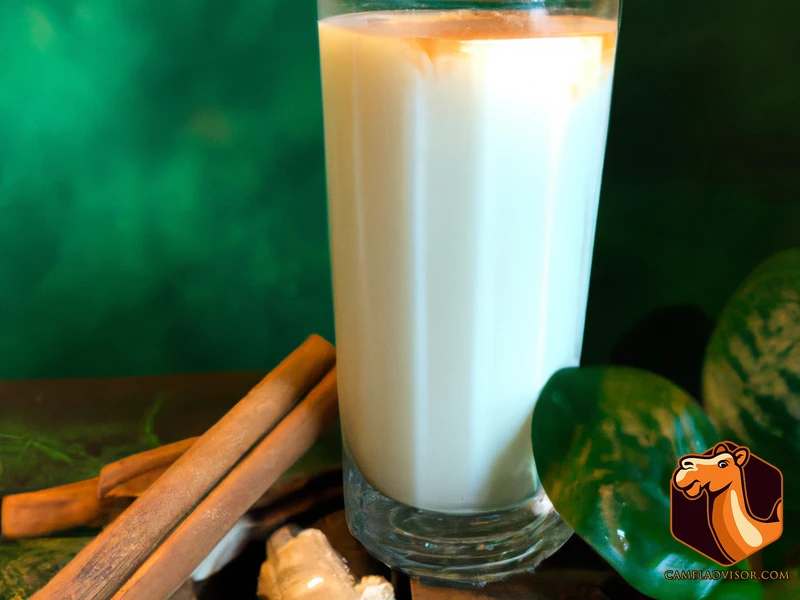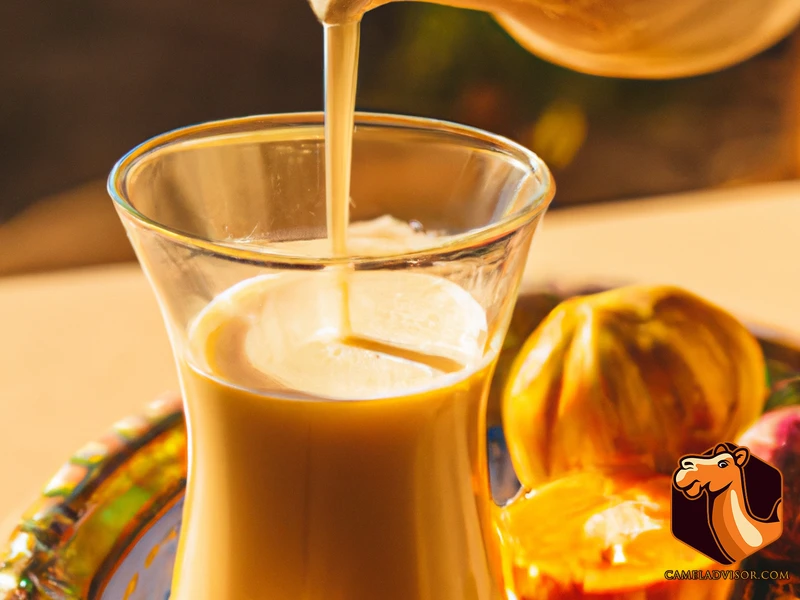It may come as a surprise to many, but camel milk has been consumed for centuries in many parts of the world. This seemingly unconventional choice of milk has, in fact, numerous health benefits. From boosting immunity to promoting heart health, the advantages of camel milk are many. In this article, we will delve into 5 surprising health benefits of drinking camel milk that will leave you wondering why it wasn’t a part of your diet before!
Contents
- Boosts Immunity
- Strengthens Bones
- Aids in Digestion
- Manages Diabetes
- Promotes Heart Health
- Conclusion
-
Frequently Asked Questions
- What does camel milk taste like?
- Is camel milk safe to drink?
- Where can I find camel milk?
- Can camel milk help with lactose intolerance?
- Does camel milk have any side effects?
- How is camel milk different from cow’s milk?
- Is camel milk a good source of protein?
- Can camel milk help with eczema?
- Can camel milk be used as a substitute for breast milk?
- Does camel milk have any cultural significance?
- References
Boosts Immunity

It may come as a surprise, but adding camel milk to your diet can be extremely beneficial for your health. In fact, this unique milk has been known to boost immunity and fight against various diseases. Camel milk has been used for centuries due to its medicinal properties and is gaining popularity in western countries. So, how can camel milk help with your immune system? Let’s explore the two main reasons: it is rich in immunoglobulins and has antimicrobial properties.
Rich in Immunoglobulins
Camel milk is highly valued for its health benefits, and one of the reasons is that it is rich in immunoglobulins. Immunoglobulins, also known as antibodies, are proteins that play a crucial role in the immune system by fighting against disease-causing agents. These could be bacteria or viruses. Camel milk is abundant in immunoglobulins, which can help boost immunity in humans.
The following are some of the benefits of the immunoglobulins found in camel milk:
- Protect against infections: The presence of immunoglobulins in camel milk makes it helpful in protecting against various infections. Ingesting camel milk can sometimes help the body develop immunity to certain diseases or illnesses.
- Boost the body’s immune response: When the immune system detects a threat, it produces an immune response. Camel milk’s immunoglobulins can boost the body’s immune response, making the body more effective at fighting off infection and illness.
- Reduce inflammation: Inflammation is a natural response by the immune system to injury or infection. However, chronic inflammation can lead to a number of health problems. The immunoglobulins found in camel milk could help reduce inflammation.
The immunoglobulins in camel milk make it an excellent addition to the diet as they can protect against infections, boost the body’s immune response, and reduce inflammation. These properties make camel milk an excellent choice for individuals with poor immune function or those who are susceptible to infections. It can be helpful in the treatment of a variety of illnesses. If you want to read more about how camel milk fight a disease, follow the link /camel-milk-fight-disease/.
Antimicrobial Properties
One of the surprising health benefits of drinking camel milk is its antimicrobial properties. These properties make it effective in preventing the growth of harmful microorganisms in the body. The table below provides a list of some of the microorganisms that camel milk can help fight against:
| Microorganism | Effect of Camel Milk |
|---|---|
| Staphylococcus aureus | Camel milk has been shown to be effective in inhibiting the growth of Staphylococcus aureus, a bacteria that can cause skin infections, respiratory problems, and food poisoning. |
| Salmonella | Camel milk has also been found to be effective in preventing the growth of Salmonella, a bacteria that can cause diarrhea, fever, and stomach cramps. |
| E. Coli | Studies have shown that camel milk can help inhibit the growth of E. Coli, a bacteria that can cause digestive problems and urinary tract infections. |
In addition to these benefits, camel milk also contains many essential nutrients that can help boost the immune system and promote overall health. Its high levels of immunoglobulins are particularly beneficial for fighting off infections and diseases. Camel milk is easy to digest, making it a great option for those with digestive issues. Drinking camel milk can also help manage diabetes and promote heart health. Camel milk is a great alternative to traditional cow’s milk and provides many unique health benefits.
Strengthens Bones
As we age, our bones become more fragile and prone to fractures. This can greatly affect our quality of life and mobility, making it important to take care of our bone health. Camel milk is not only a tasty alternative to cow’s milk, but it is also rich in nutrients that are essential for maintaining healthy bones. In fact, studies have shown that camel milk may even be more beneficial for bone health than cow’s milk. Let’s explore some of the key nutrients in camel milk that help support strong bones. To learn more about the benefits of camel milk compared to cow’s milk, click here.
High in Calcium
Camel milk is a rich source of calcium, which is crucial for maintaining healthy bones and teeth. Calcium is also essential for proper muscle and nerve function, and blood clotting. It is required to maintain the normal body functions. Camel milk contains about 150 milligrams of calcium per 100 milliliters of milk, which is higher than cow’s milk.
Calcium content in different types of milk per 100 ml:
| Type of Milk | Calcium Content (mg) |
|---|---|
| Camel Milk | 150 |
| Cow Milk | 120 |
| Sheep Milk | 170 |
| Goat Milk | 135 |
Calcium in camel milk is easily absorbed by the body due to the presence of lactoferrin and other minerals, such as magnesium and potassium. The high calcium content in camel milk makes it an excellent dietary option for people who are lactose intolerant, as it offers an alternative to cow’s milk.
Consuming camel milk regularly can help in preventing bone fractures, osteoporosis, and other bone-related diseases. It also helps in maintaining dental health as calcium is essential for strong teeth. The high calcium content in camel milk makes it a convenient dietary source, especially for people with calcium deficiency.
The high calcium content in camel milk makes it a valuable dietary option. Regular consumption of camel milk can help maintain healthy bones and teeth, and balance calcium levels in the body. Incorporating camel milk into your daily diet can offer several health benefits, including promoting strong bones and teeth.
Rich in Vitamin D
Camel milk is not just any ordinary milk, it is packed with nutrients that are essential for our overall health. One of the most important nutrients found in camel milk is Vitamin D.
Vitamin D is an essential vitamin that is responsible for several important functions within our body. One of the most important roles of Vitamin D is to regulate the absorption of calcium and phosphorus in our body. This, in turn, helps to maintain healthy bones and teeth. Vitamin D is also important in regulating our immune system, promoting healthy muscle function and reducing inflammation.
Camel milk is known to be rich in Vitamin D, making it an excellent source for those who are lacking in this essential vitamin. Studies have shown that consuming camel milk regularly can significantly improve Vitamin D levels in our body.
In fact, a cup of camel milk provides us with around 30% of our daily recommended intake of Vitamin D. This means that by adding camel milk to our diet, we can easily meet our daily Vitamin D requirements and enjoy the numerous health benefits that come along with it.
To learn more about the health benefits of camel milk, check out our other articles on camel milk and immune health, calcium health, managing diabetes, relief from digestive issues, and skin health.
Aids in Digestion

Camel milk is becoming more and more popular due to its extensive health benefits. One benefit that stands out is its ability to aid in digestion. This is important because digestion is crucial to overall health. The probiotic properties of camel milk help support a healthy gut microbiome, leading to better nutrient absorption and improved digestive function. Additionally, camel milk is easy to digest, making it a great option for those with sensitive stomachs or digestive issues. Let’s explore the ways in which camel milk can aid in digestion in more detail.
Probiotic Properties
Camel milk is known to have several health benefits, including its probiotic properties. Probiotics are beneficial bacteria that aid in digestion and support gut health. Here are some ways camel milk can help with digestion:
- Increases Good Bacteria: The probiotics found in camel milk can help increase good bacteria in the gut. This can help with digestion and reduce the risk of problems like bloating and constipation.
- Supports Immune System: The probiotics in camel milk can also help support the immune system. A healthy gut can improve the body’s ability to fight off infections and diseases.
- Reduces Inflammation: Inflammatory bowel disease can cause discomfort and digestion issues. Some studies have shown that camel milk’s probiotic properties can help reduce inflammation and alleviate symptoms.
- Improves Nutrient Absorption: Camel milk’s probiotics can also aid in nutrient absorption by breaking down food and making it easier to process.
Incorporating camel milk into your diet can have several benefits for your digestive health, thanks to its probiotic properties.
Easy to Digest
Camel milk is known to be easy to digest, making it a great alternative for individuals who struggle to digest lactose. This can be explained by the unique combination of nutrients found in camel milk. Let’s take a closer look at some of these nutrients in the table below:
| Nutrient | Amount (per 100ml) | Function |
|---|---|---|
| Protein | 2.9g | Builds and repairs body tissues |
| Fat | 3.0g | Provides energy and insulation |
| Lactose | 4.7g | Primary carbohydrate, source of energy |
| Vitamin C | 3mg | Boosts immune system, antioxidant |
| Vitamin B1 (thiamine) | 0.03mg | Helps convert food into energy |
| Minerals (calcium, magnesium, potassium) | Varies by region | Key electrolytes for muscle and nerve function, bone health |
Camel milk’s lower fat content, compared to cow’s milk, means that it is less likely to cause digestive discomfort. Additionally, the protein in camel milk is different from that in cow’s milk, which may also contribute to easier digestion. Finally, camel milk contains natural probiotics, which help to break down food in the gut and aid digestion. All of these factors make camel milk a good option for individuals with sensitive stomachs or digestion issues.
Manages Diabetes
One of the health benefits of camel milk that may surprise you is its potential to help manage diabetes. This creamy white liquid has a unique nutrient profile that sets it apart from other types of milk. It’s low in fat and sugar but high in insulin, making it a promising option for those with diabetes. Let’s take a closer look at how camel milk can support healthy blood sugar levels.
Low in Fat and Sugar
Camel milk is a great addition to diabetic diets as it is low in fat and sugar. Compared to cow milk, it has less fat content, making it a great choice for those who are watching their weight. It is a better alternative to cow milk as it contains healthy nutrients without the high sugar content found in cow milk.
To further understand the difference in fat and sugar content between camel milk and cow milk, see the table below:
| Camel Milk | Cow Milk | |
|---|---|---|
| Calories (per 100g) | 70 kcal | 67 kcal |
| Total Fat (per 100g) | 3 g | 3.7 g |
| Sugar (per 100g) | 5 g | 4.8 g |
From the table, we can see that while the calories in both types of milk are almost the same, camel milk contains less total fat and slightly more sugar than cow milk. However, it is important to note that camel milk has a lower glycemic index compared to cow milk. This means that it does not lead to a rapid spike in blood sugar levels after consumption.
The low fat and sugar content of camel milk, combined with its high insulin content, make it an effective natural treatment for diabetes management. Drinking camel milk regularly has been shown to help regulate blood sugar levels and reduce reliance on medications for managing diabetes.
High in Insulin
Camel milk has been found to be high in insulin, making it a beneficial drink for people with diabetes. Insulin is a hormone produced in the pancreas that helps regulate blood sugar levels in the body. Those who have diabetes often have difficulty producing or using insulin properly, which leads to high blood sugar levels. Drinking camel milk, which contains natural insulin, can help manage blood sugar levels.
Here is a table highlighting the insulin content of camel milk:
| Nutrient | Amount per 100ml |
| Insulin | 52.5µU/ml |
Research has shown that the insulin in camel milk is structurally similar to human insulin, which makes it easier for the body to use. People with type 1 diabetes who consumed camel milk experienced significant reductions in fasting blood sugar levels, according to a study published in the Journal of Endocrinology and Metabolism.
It is important to note that camel milk should not be used as a replacement for insulin injections or other diabetes medications. It should be used in combination with a healthy diet and exercise routine to help manage blood sugar levels. As always, it is recommended to consult with a healthcare professional before making any significant changes to your diabetes management plan.
Promotes Heart Health
When it comes to maintaining good health, taking care of our heart becomes crucial. We often rely on conventional foods and beverages to promote heart health, but did you know there’s a surprising option available? That option is camel milk. Yes, you read it right! Camel milk has been found to have numerous health benefits, and promoting heart health is one of them. In this section, we will explore the ways in which camel milk can boost heart health and keep the organ functioning optimally. So let’s dive in and discover the surprising benefits of camel milk for our heart!
Reduces Bad Cholesterol
Camel milk is a rich source of nutrients that offer several health benefits. One of the notable benefits of drinking camel milk is that it can reduce bad cholesterol levels in the body. The high levels of polyunsaturated fatty acids, such as linoleic acid and oleic acid present in camel milk, help to reduce the levels of low-density lipoprotein (LDL) or bad cholesterol in the body.
A study published in the Journal of Dairy Science demonstrated that consuming camel milk for 4 weeks helped lower LDL cholesterol levels by 30%. This is significant since high levels of LDL cholesterol in the body can result in the buildup of plaque in arteries and increase the risk of heart disease and stroke.
Here’s a table that highlights some of the key nutrients in camel milk, which contribute to its ability to reduce bad cholesterol:
| Nutrient | Amount per 100 ml |
|---|---|
| Polyunsaturated fatty acids | 0.37 g |
| Monounsaturated fatty acids | 1.20 g |
| Protein | 2.90 g |
| Vitamin C | 3.0 mg |
| Iron | 0.05 mg |
| Calcium | 120 mg |
The combination of these nutrients helps to reduce bad cholesterol levels in the body, making camel milk a heart-healthy alternative to other dairy products. Additionally, camel milk’s relatively low-fat content compared to cow milk and its richness in healthy fats also contribute to its ability to reduce bad cholesterol levels in the body.
Rich in Healthy Fats
One of the surprising health benefits of drinking camel milk is that it is rich in healthy fats. These fats are essential for maintaining good health, and can have a positive impact on heart health, weight management, and brain function.
Camel milk is a rich source of medium-chain fatty acids, which have been shown to boost energy levels and support weight loss. In fact, research has shown that consuming medium-chain fatty acids can increase metabolism and lead to greater weight loss compared to other types of fats.
In addition to supporting weight management, camel milk is also high in monounsaturated and polyunsaturated fats, which have been linked to a reduced risk of heart disease. These healthy fats can help to lower levels of LDL (or “bad”) cholesterol, while increasing levels of HDL (or “good”) cholesterol.
Camel milk contains omega-3 and omega-6 fatty acids, which are important for brain function and development. These essential fatty acids cannot be produced by the body and must be obtained through diet. With its rich profile of these healthy fats, camel milk is a great choice for those looking to promote overall health and wellness.
To summarize, camel milk is not only a rich source of protein, vitamins, and minerals, but it is also high in a variety of healthy fats that can have a positive impact on heart health, weight management, and brain function. Consider adding camel milk to your diet as part of a healthy and balanced lifestyle.
| Healthy Fats in Camel Milk | Health Benefits |
| Medium-chain fatty acids | Boosts energy levels and supports weight loss |
| Monounsaturated and polyunsaturated fats | Reduces risk of heart disease by lowering LDL cholesterol and increasing HDL cholesterol |
| Omega-3 and omega-6 fatty acids | Important for brain function and development |
Conclusion
In conclusion, it is clear that drinking camel milk can bring various benefits to one’s health. From boosting immunity to promoting heart health, camel milk contains a range of nutrients that are essential for maintaining a healthy body. It is rich in immunoglobulins and has antimicrobial properties which help to boost the immune system, making the body more resistant to infections and diseases.
Camel milk is also high in calcium and vitamin D, both of which are important for strong bones. Additionally, its probiotic properties and easy digestibility make it a good aid for digestion.
For those with diabetes, drinking camel milk can be beneficial as it is low in fat and sugar and high in insulin, which helps to regulate blood sugar levels. And finally, camel milk’s ability to reduce bad cholesterol and high amounts of healthy fats make it a good addition to a heart-healthy diet.
Overall, camel milk proves to be a nutritious drink that offers many benefits to one’s health. So, consider adding it to your diet to experience its numerous health benefits.
Frequently Asked Questions
What does camel milk taste like?
Camel milk has a slightly salty and creamy taste that is comparable to cow’s milk.
Is camel milk safe to drink?
Yes, camel milk is generally safe to consume for most individuals. However, people with lactose intolerance or milk allergies should avoid it.
Where can I find camel milk?
Camel milk can be found in specialty stores, online retailers, and in some Middle Eastern or African markets.
Can camel milk help with lactose intolerance?
Yes, camel milk is lower in lactose than cow’s milk and may be better tolerated by individuals with lactose intolerance.
Does camel milk have any side effects?
Camel milk is generally safe for most people to consume, but excessive consumption may lead to gastrointestinal discomfort.
How is camel milk different from cow’s milk?
Camel milk is lower in fat and lactose than cow’s milk and has a different nutritional profile. Camel milk is also higher in certain vitamins and minerals such as Vitamin C, iron, and calcium.
Is camel milk a good source of protein?
Yes, camel milk is a good source of protein and contains all essential amino acids needed by the human body.
Can camel milk help with eczema?
Some studies suggest that camel milk may be beneficial for individuals with eczema due to its anti-inflammatory properties, but more research is needed to confirm these findings.
Can camel milk be used as a substitute for breast milk?
No, camel milk is not a suitable substitute for breast milk or infant formula as it does not contain the proper balance of nutrients needed for infant growth and development.
Does camel milk have any cultural significance?
Yes, camel milk has played an important role in the diet and culture of nomadic cultures in the Middle East and Africa for centuries. It is seen as a symbol of hospitality and is often used in traditional ceremonies and celebrations.







